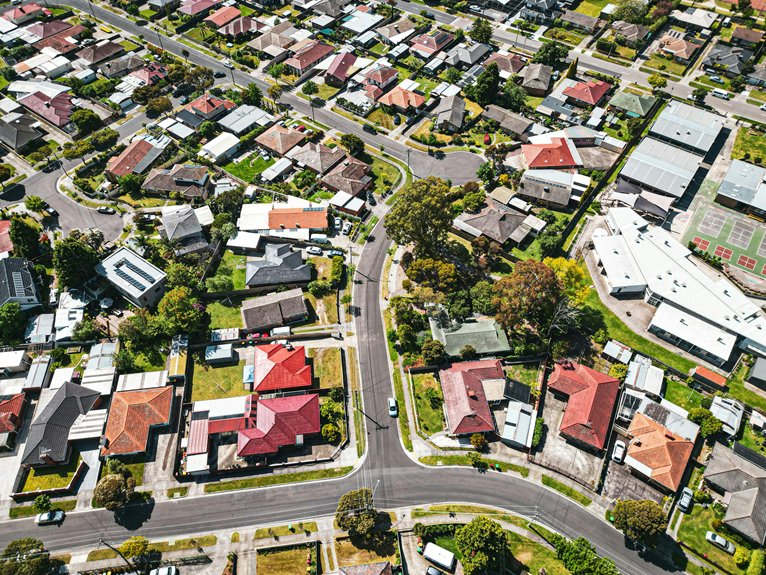Aussies Struggle to Survive After Rent
The struggle to afford basic needs after rent is a harsh reality for many Australians, with a growing proportion of low-income earners facing significant financial strain due to rising housing costs. Over 70% of suburbs face unaffordable housing conditions, with rental prices exceeding the means for full-time minimum wage earners.
This has led to an increased risk of homelessness among low-income individuals, with over 50% of minimum-wage earners spending over half their income on rent.
Experts argue that government assistance, including a 10% increase in Commonwealth Rent Assistance, falls short of addressing rising living costs, necessitating a closer examination of systemic solutions.
Housing Affordability Crisis Deepens
Amidst the ongoing struggle of vulnerable Australians to make ends meet, the housing affordability crisis continues to worsen, with low-income earners being hit the hardest.
The issue is deeply rooted in the country’s housing policy, which has failed to keep pace with the rising costs of living. According to experts, the current housing policy has significant community impact, exacerbating poverty and social inequality.
Maiy Azize from Everybodys Home highlights the need for a sustainable solution, stating that “the dire need for affordable housing is a systemic issue that requires a thorough approach.”
The government must reassess its housing policy to address the crisis, prioritizing affordable housing projects and adjusting Centrelink payments to reflect the real cost of living.
Rental Market Challenges Revealed
One in five Australian renters are finding themselves priced out of the rental market, with the majority of suburbs experiencing unaffordable housing conditions.
Rental market dynamics have become increasingly challenging for tenants, with many struggling to balance rent payments and basic living expenses. This has led to a surge in rental stress, with many low-income earners facing significant difficulties in meeting their housing costs.
Key rental market challenges include:
- Unaffordable housing conditions in over 70% of suburbs
- Rental prices exceeding means for full-time minimum wage earners
- Increased risk of homelessness among low-income individuals
- Overcrowding and share housing becoming more common due to unaffordable housing
With tenant rights under pressure, there is a growing need for policy reforms to address these issues and provide more affordable housing options for vulnerable Australians.
Government Assistance Falls Short
Five million Australians rely on Centrelink support, yet the assistance provided by the government often falls short of meeting their basic needs.
Despite recent Centrelink reforms, poverty alleviation efforts continue to face significant challenges. The biannual indexation of Centrelink payments has been reviewed, and a 10% increase in Commonwealth Rent Assistance has been noted.
However, experts argue that these measures are insufficient to address the rising costs of living. Maiy Azize from Everybodys Home emphasizes the dire need for affordable housing and criticizes the inadequate government response to the housing crisis.
Calls for raising Centrelink payments above the poverty line have been made, highlighting the need for adjustments to reflect the real cost of living.
Homelessness and Financial Strain
Financial strain is having a profound impact on low-income Australians, as the struggle to make ends meet after paying rent is becoming increasingly dire.
The consequences of this financial strain are far-reaching, with many individuals facing shelter insecurity and struggling to maintain financial resilience.
Some key statistics highlighting the issue include:
- Increased risk of homelessness among low-income individuals.
- Share housing and overcrowding becoming more common.
- Difficulty in moving out of family homes due to high rents.
- Challenges in finding affordable housing in new areas.
These statistics underscore the severity of the issue, with many Australians struggling to find secure and affordable housing.
The financial strain caused by high rents is having a profound impact on low-income Australians, making it essential to address the issue of housing affordability.
Expert Voices Demand Change
Many voices within the housing sector, including advocacy groups and experts, are uniting to call for change as the Australian housing crisis deepens.
Expert insights suggest that a multifaceted approach is necessary to address the issue effectively. Maiy Azize from Everybodys Home emphasizes the need for systemic solutions, stating that the current system is inadequate in providing affordable housing.
According to Azize, the government’s response to the crisis has been insufficient, and urgent action is required to prevent further poverty escalation.
Experts stress that thorough policy changes are necessary to address the root causes of the housing affordability crisis, including adjustments to Centrelink payments and increased investment in affordable housing projects.
These changes can help alleviate the financial strain on low-income earners and provide a more stable housing environment.
Rental Price Pressures Persist
Despite a slight slowdown in growth, rental prices in Australia continue to rise, exacerbating the housing affordability crisis and placing immense pressure on low-income earners.
The rental market dynamics are heavily skewed against tenants, with prices increasing despite government assistance.
Key statistics highlighting the issue include:
- Over 50% of minimum wage earners spend more than half their income on rent.
- Rental stress affects those spending 30% or more of their income on rent, a reality for many low-income earners.
- The average rental price exceeds the means of most suburbs, making it difficult for people to afford housing.
- Tenant rights are often overlooked, with many facing eviction or rent increases without sufficient notice.
These statistics underscore the need for urgent action to address the rental market imbalances and guarantee tenant rights are protected.
Towards Sustainable Housing Solutions
Addressing the housing affordability crisis and creating a more sustainable rental market requires a multi-faceted approach that prioritizes the needs of low-income earners and promotes long-term housing security.
To achieve this, a combination of community engagement and policy innovation is necessary. Maiy Azize from Everybodys Home emphasizes the importance of recognizing systemic issues driving the housing crisis.
Experts suggest that increasing investment in affordable housing projects, adjusting Centrelink payments to reflect the real cost of living, and implementing sustainable policies can help alleviate rental market imbalances.
Effective solutions will involve collaboration between government agencies, community organizations, and stakeholders to guarantee that housing policies are informed by real-world experiences and data-driven insights.
This collaborative approach is vital for developing targeted interventions that address the root causes of the housing affordability crisis.







